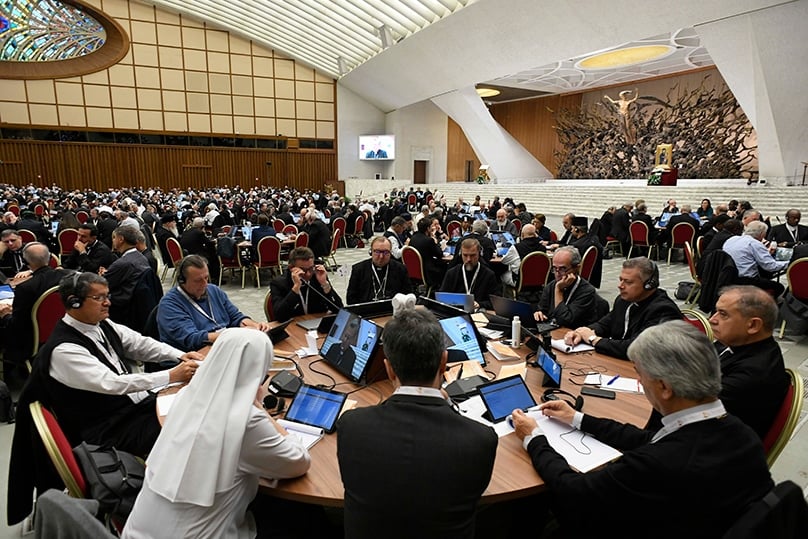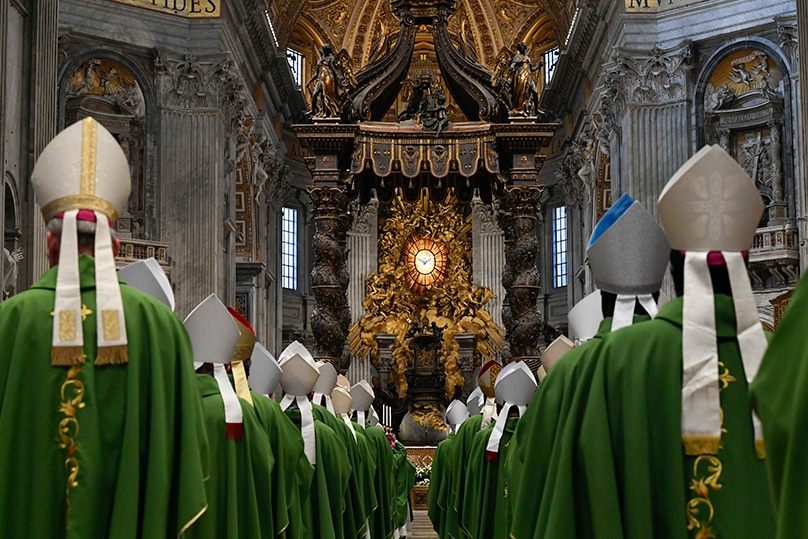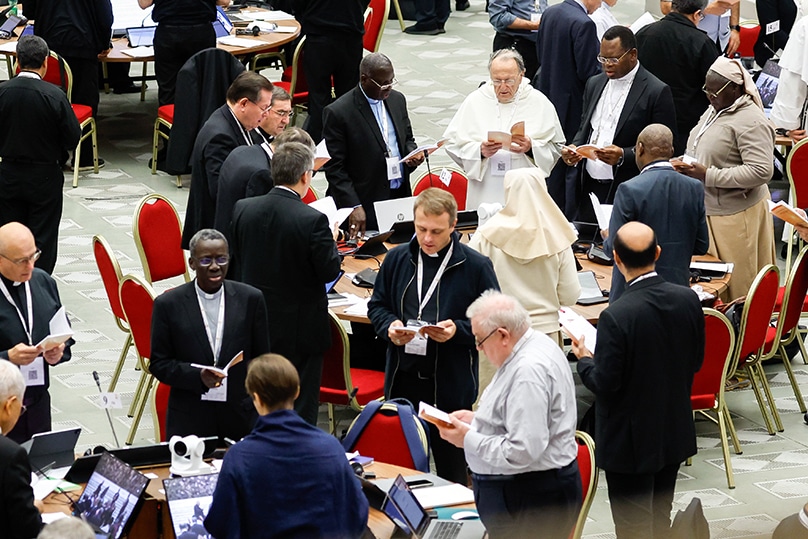
By Monica Doumit, in Rome
The first assembly of the Synod on Synodality concluded on Sunday, with a closing Mass celebrated in St Peter’s Basilica and presided over by Pope Francis.
“We are always at risk of thinking that we can control God; that we can confine his love to our own agenda,” the pope said in his homily at the closing Mass.
“Instead, the way he acts is always unpredictable and consequently demands amazement and adoration.”
While not specifically addressing the outcome of the synod at its halfway point, the Holy Father’s words could certainly have been describing its synthesis report, which contained very little of what was predicted in the weeks and months leading up to this historic assembly.
The synthesis report was voted on by synod members late on Saturday evening, Rome time.
Members were due to receive the final document in hard copy at 11am, with voting to begin at 3:30pm.
However, with more than 1000 proposed changes to the draft document members received on Wednesday, the English translation was running late and not received until closer to 1:30pm.
Members were left just two hours to read the 41-page document before being assembled for the final session, which ran more than an hour overtime, with members not leaving the Paul VI Hall until close to 9pm.
The synthesis report received overwhelming support from members, with every proposed paragraph being approved by the requisite two-thirds majority of the membership.
Report muted on hot-button issues
Split into 20 separate sections, the report first addressed the notion of synodality and the need for it to be further studied and explained in theological and canonical disciplines, as well as encouraging local churches to experiment with “conversations in the Spirit” and other forms of ecclesial discernment.
In a section on the liturgy, the synthesis report affirmed the importance of the Mass, noting that “liturgy celebrated with authenticity is the first and fundamental school of discipleship.”
In a proposal that could be seen as contradictory to this call for authentic liturgy, however, the section also called for “liturgical language more accessible to the faithful and more embodied in the diversity of cultures,” and suggested local episcopal conferences could be entrusted with more responsibility when it comes to liturgical language.

Unsurprisingly, there was a strong focus on the poor and others who are marginalised and an insistence that all Christians are called to encounter and serve the most needy.
“The experience of encounter, sharing a common life and serving those living in poverty and on the margins should be an integral part of all formation paths offered by Christian communities: it is a requirement of faith, not an optional extra,” the report reads.
There was a commitment to the embracing of diversity, whether that diversity comes from nations and cultures, or Eastern and Western Catholic traditions, and a call for more work to be done on the unity of all Christian peoples.
Conscious that all Christians are called to proclaim the Gospel, the report had numerous proposals on calling forth the gifts of the whole church, especially the young, women and those in consecrated life.
There was also a section devoted to evangelisation in the digital environment, recognising that this often the primary form of encounter for the young.
Contrary to speculation prior to the synod, the synthesis document did not endorse blessings for same-sex couples, nor propose changes to the church’s moral tradition on matters of gender or sexual identity.
The sole proposal in the section dedicated to contentious issues simply called for “initiatives enabling shared discernment on controversial doctrinal, pastoral and ethical issues should be developed, in the light of the Word of God, Church teaching, theological reflection and an appreciation of the synodal experience.”
The ordination of women to the diaconate was raised several times in the synthesis report, including a proposal for the continuation of “theological and pastoral research on the access of women to the diaconate.”

The sections related to the female diaconate, although approved by the assembly, received the highest number of “No” votes.
Paragraphs suggesting a reconsideration of priestly celibacy, and also proposing readmitting men who have left the priesthood to serve as priests, also received a higher number of “No” votes.
Deeper shifts may be problematic
It is possible that the muted treatment of the hot-button issues may serve as a distraction to sections that are more theologically problematic.
For example, paragraph 2(f), which suggests the criteria for ecclesial discernment should be deepened to include not only a listening to the “Word of God attested to in Scripture [and] the reception of Tradition and the Magisterium of the Church,” but also to a “prophetic reading of the signs of the times.”
The significance of elevating the “signs of the times” to the level of Scripture and tradition, a key feature of Germany’s “synodal way” did not seem to concern members, however, with only 11 of 344 votes opposing this paragraph.
The paragraph immediately following, which calls for the integration of “feelings and reason” (as opposed to “faith and reason”) similarly went unquestioned, with only 17 votes against.
Theologically significant paragraphs 3(c) and 7(b) drastically depart from the current understanding of the sensus fidei, suggesting that it is held by each Christian, even if not a Catholic, rather than the whole People of God, together with the bishops.
These received slightly more opposition (26 and 28 “No” votes, respectively), but not nearly enough to suggest that synod members were concerned about the importance of the change these proposed.
Indeed, the role of the bishop as teacher, governor and sanctifier was continually downplayed throughout the report, another theme that failed to raise much opposition from the bishops in the hall.
As the synthesis report is further unpacked, it is likely that these less polarising but more theologically substantial paragraphs will become the focus of the months before the Synod’s second assembly, which is due to begin in October 2024.
